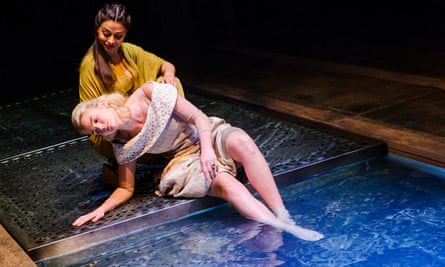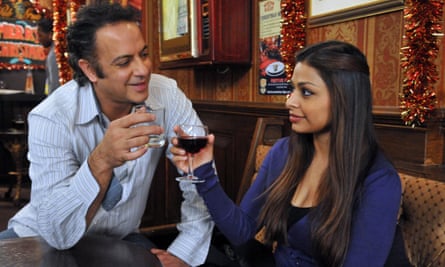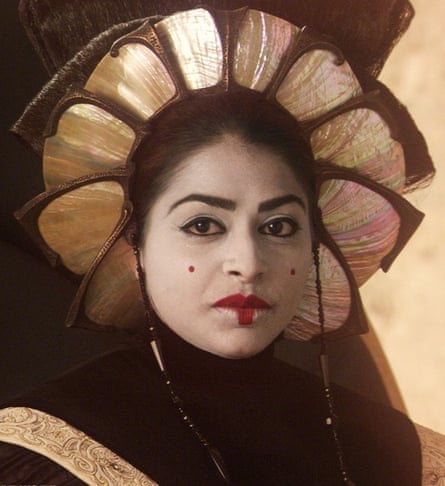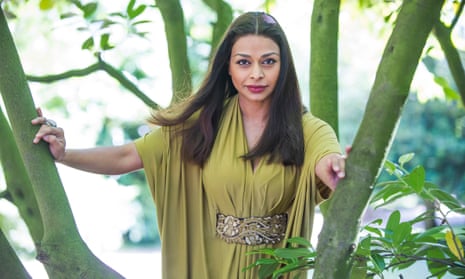Near the end of our meal together, the actor Ayesha Dharker looks up from her plate and asks suddenly: “Why are you here? Why are you interviewing me?” Well, I tell her, there can’t be too many actors whose careers incorporate Shakespeare, Coronation Street, Andrew Lloyd-Webber and Star Wars, as hers does. That’s got to be noteworthy. She looks sceptical. But then she takes everything, even her work, with a pinch of salt. “I normally try to talk directors out of casting me. I like going up for things but I don’t always intend to do them. I’ll tell them what a terrible mistake they’d make if they cast me.” Do they listen? “No. Those are the jobs I usually end up getting. Once they’ve got me, I’ll work hard. I just want them to know that I’m a bit of a slippery fish.” She stabs at a chunk of broccoli with her fork.
We are in the restaurant at the RSC in Stratford-upon-Avon, the late-afternoon rain pelting the windows, and Dharker has just finished a matinee performance of Othello, in which she is electrifying as Iago’s wife Emilia. As Iago’s single-minded campaign to destroy Othello escalates, she seizes her chance to be noticed by him again, reshaping herself in the face of his neglect into more of an accomplice than a spouse. “She’s realised that she can’t get his attention sexually or through being a good wife. All that’s left is this.” Though Dharker has been playing Emilia since early June, and will do so until the end of next month, the role remains enigmatic to her. “Why doesn’t she open her mouth when the consequences begin to dawn on her?” she demands. “Yes, she’s a victim of abuse, but so was Tina Turner!” Her eyes, already strikingly large, widen in exasperation.

Her conversation is characterised by an air of enchanted bewilderment; she recounts fascinating episodes in her career in the manner of a person wondering how these miracles could have happened to her of all people. Perhaps this comes from never wanting to be an actor in the first place. When she was nine, auditions were held at her school in Mumbai for the lead in The Girl Who Lived Twice, a French film about a child who realises she has been reincarnated. Discovering that anyone who took part would be exempt from that afternoon’s maths lesson, Dharker wasted no time in volunteering. Quite unexpectedly, she got the job. You could say her entire career sprang not from a love of acting but a loathing of maths.
Now 37, she makes everything that has occurred since then sound no less accidental or arbitrary. Only once, she says, has she desperately wanted a particular role: Shahrazad in Dominic Cooke’s production of Arabian Nights at the RSC. “I got it, thank God. But that feeling was not a pleasant place to be. It was so unfamiliar to me.” She accepts that her blase manner is a defence mechanism to stop herself getting hurt. “I’m obviously a control freak and I have issues with failure. It’s very convenient for me to say it’s no big deal if I don’t get something.”

She has a habit of affecting nonchalance about work she has already done. She refers jokingly to having sold her soul during a year-long stint on Coronation Street. (She played Tara, whose revenge on the shop-owner Dev for his infidelity was to unfurl a huge naked picture of him across an entire block of flats.) “I grew up looking down on commercial entertainment but I liked doing Coronation Street. If you’re going to do a soap, that’s the one to do. I did a musical, too, and that’s a big instance of selling my soul. But it was great.”
She’s referring to Andrew Lloyd-Webber’s Bombay Dreams, in which she appeared in the West End and on Broadway as a Bollywood performer. “I based her on Bette Davis meets Miss Piggy. That was another job where I made it really hard for them to cast me.” How so? “Well, I didn’t turn up.” Having taken part in early workshops, she decided not to put herself forward for the show proper. One morning, she was shopping near where the auditions were being held when she ran into someone from the production. “He said, ‘You’re here! For the auditions!’ I said, ‘No, I’m on my way to the bead shop.’ He told me I had to come in because they’d made the part bigger especially for me.” And the rest is, well, typical of Dharker. She always seems to get what she says she doesn’t want.
I remind her that there is a school of thought that says there is no such thing as an accident. Why go shopping on that morning in that street when there was a chance you would meet someone from the show? She thinks on this. “It’s possible,” she concedes, then reverses her position. “But no. When you look at the strangeness of how something like Star Wars happened ...” She has a point. In 1998, Dharker had given a riveting, near wordless performance as a young suicide bomber in a Tamil drama called The Terrorist, inspired by the assassination of Rajiv Ghandi. The picture was awarded the top prize at the Cairo film festival by John Malkovich, who later championed it in the US press. The late Roger Ebert was another fervent fan. The casting director for the second Star Wars prequel, Attack of the Clones, came across this rave review, borrowed a VHS copy of The Terrorist from Samuel L Jackson, then managed to reach Dharker through a circuitous route of producers and directors and eventually her own father. “I didn’t bother calling when I got the message because I thought it was a joke,” she says. “When the casting director finally got hold of me, she said, ‘Don’t worry. We hear that a lot.’”

Dharker was visually memorable as Queen Jamillia despite having only five lines. But she has said that the costume – layered black-and-gold capes topped off with a fan of gold blades like petals on a flower – did most of the acting. Could she call it a performance? “I didn’t have enough to do to answer that question.” Still, she got to meet George Lucas, even if she never saw the proposed doll of her character. “I don’t think they made one. I know the girl characters don’t sell as well as the boy ones. I feel sorry for any child who got given one of me – this small, Indian penguin.”
Despite her declaration that she has “major commitment issues generally”, she seems most contented when talking about her husband, who is in the vitamins industry, and their three-year-old daughter. Though now settled in London, Dharker never really had a permanent home in her adult life. “People used to ask me when exactly I came over here, and it was something I found impossible to answer. I bought a flat here, but then I was in the US working for ages. That’s why I have a lot of bedding. I’d always be put up in apartments or hotels when I was working, and I wanted a part of it to feel like mine, so I’d buy my own sheets. I’ve accumulated quite a lot.” She’s made her bed. After years of resisting, she’s finally getting to lie in it.

Comments (…)
Sign in or create your Guardian account to join the discussion